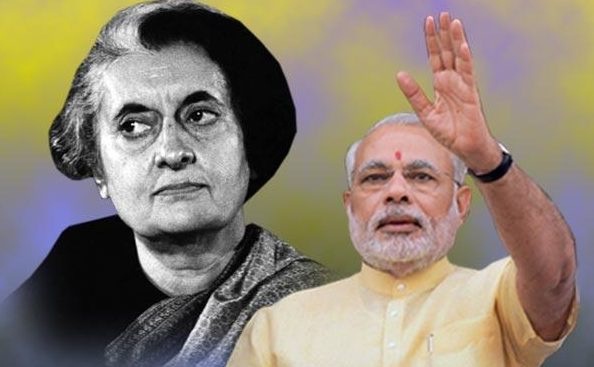
The Tale of Two Emergencies – Indira Gandhi vs Narendra Modi
India is a democratic country. It has less scope for an emergency. The state of emergency can only be declared when there is an external aggression or internal insurgency. There is a scope for a financial emergency. Indira Gandhi enacted emergency in India and many leaders of the opposition were put in the jail.
What followed after the emergency was the shift in power and Janata Party Government came to power. It was the first great political transition in India. But the subsequent election gave a massive verdict in favour of Indira Gandhi and her hold over power remained strong and consolidated. The most draconian year was the year 1975.
In the recent “Man Ki Baat” episode, Narendra Modi remembered “emergency days” and called it a blot on “Indian democracy”. He is right in declaring a blot on Indian democracy. It really was. But what is the locus standi of Narendra Modi to call it a blot? His Government is imposing undeclared unofficial emergency in India.
A young Muslim boy is murdered and thrown out of the running train receives no attention from Narendra Modi, the Prime Minister of “Emergent India”.
He took weeks before responding to growing agitation after Rohith Vemula’s institutional murder and his response was lame. He utters only a couple of words when the people are murdered by the Gau Rakshaks (Cow Vigilantes) and he does nothing to stop “Gau Rakshak Ayog: Commission for Protection of Cows” in the state of UP. He had nothing to say when four Dalit youths in Una were flogged mercilessly. India is facing an emergency and Indian aspirations are sugarcoated by the state-sponsored media.
It is time for PM Modi to concentrate on domestic affairs. The constituency that he tries to address abroad is small except the funds that they can remit to his party; their contribution to the development of India is negligible. Most of them are the beneficiaries of higher education policies in India, but they have not offered anything for the development of India.
External affairs managed by the RSS/BJP Government have been given more precedence over the domestic affairs. There is an undeclared emergency and it is destroying the soft and tender fabric of Indian democracy. It must be stopped. The social movements and strong opposition parties can stall further degradation of Indian democracy. If democracy perishes, India perishes.
Modi should give lessons in history to India’s citizens. He is doing a right thing by commenting on threats to democracy. He owes it much to democracy for without democracy “the Chaiwala” could not become the most powerful man in this country. But he is mistaking power with democracy. It is the power that must be brought in the service of democracy, and not the other way round.
His claims sound hollow and hypocritical when he does nothing to strengthen democracy in India. India needs mindful politics that transforms the divisive forces into unifying forces. India needs political and policy interventions which heal the communities and make them feel one and united. As he reflects on emergency under Indira Gandhi, he should mull over his regime, his Man Ki Baat will have no meaning if he does not tread what he preaches.
Author – Mangesh Dahiwale, Human Rights Activist



+ There are no comments
Add yours